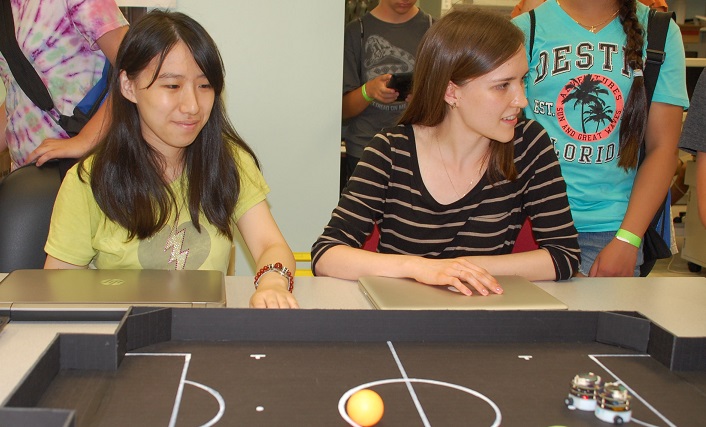
Pietro Valdastri’s STORM lab is a cacophony of whirring motors and adolescent chatter, packed with Adventure Science Center summer campers and Vanderbilt University researchers.
In a corner is a pair of high school math and science teachers learning how to make discoveries by the engineers understandable to the kids.
“In engineering, you come up with an idea, you try it, you might say, ‘It’s not working the way I thought,’ and you go back to the drawing board,” Mark Gonyea tells a group crowded around him.
Gonyea teaches Advanced Placement calculus and computer science at Stewarts Creek High in Rutherford County, but today he’s helping rising 7th through 9th graders understand the concept of tiny, modular robots. Justin Montenegro, a physics teacher at Hume Fogg Magnet High School in Nashville, sets up a maze and tells the visitors about a smartphone app they can use to guide the robots through.

It’s vitally important to the future of engineering to translate cutting-edge technology into lessons useful for K-12, says Valdastri. The assistant professor of mechanical engineering has distinguished himself on the world stage for creating capsule robots that can travel through the human digestive system, interacting with the surrounding organs and capturing information. His CAREER and Cyber-Physical Systems grants, both from the National Science Foundation, include strong educational components.
The modular design for tiny robots – snap-together, removable magnetic plates that include motorized wheels, an accelerometer, a barometer and other functions, depending on what the user wants to do – is an affordable teaching tool for most public schools. For instance, teachers can build a barometer for a fraction of a $100 commercial example commonly used in high-school classrooms, Montenegro says.
The teachers worked in Valdastri’s lab to create a kit with the robots — and software to run them — that can help teach the Next Generation Science Standards recently adopted nationwide. Those include more emphasis on engineering.
Valdastri selected Montenegro and Gonyea from 30 teachers who submitted applications for summer learning in his lab at Vanderbilt. Their visit is being supported by the National Science Foundation via the Research Experience for Teachers Supplement program.

“We want to approach learning in an experiential way,” Montenegro says. “Even if students don’t know how to program a robot, they will be exposed to robotics. They’ll get into understanding the design feedback loop. With the new science standards we’re pushing, it’s important not to just know the basic facts, but to engage in the process of making things work better.”
Also selected for summer research were Vanderbilt undergrads Ashley Peck (ME’17), who is supported by NSF, and Jianing Liu (CE’16) and Yasmin Alvarado-Rayo, a high school student enrolled in the School for Science and Math at Vanderbilt. Peck designed the robot-controlling app, which can send them streaking through the maze or across a tabletop soccer field, where an orange ping-pong ball serves as the target. Liu is developing a Google Chrome app so younger students more easily can program the robots.
“Most of the summer was spent developing the app,” Peck says. “I loved being able to see kids playing with it shortly following that. It was interesting to hear the questions and suggestions they had, which were things we’d considered, too.”
The kits will be in classrooms this fall, and the team plans to collect and analyze data about what students learn from using them. Researchers will look at gains on standardized science and math test, attitudes toward careers in research science, admission rates for college and choice of majors.

They’re seeking donations to put the kits into as many classrooms as possible. With $1,000, Valdastri says, his team can put 10 kits in a school. Interested donors can contact him.
The research is being overseen by Ekawahyu Susilo, a postdoctoral scholar who coordinated the work on STORM Lab Modular Architecture for Capsules robotic toolkit in collaboration with Dr. Vicki Metzgar, director of the Middle Tennessee STEM Innovation Hub.
CLICK HERE to watch a video of the tiny robots in action.
Contact
Heidi Hall, (615) 322-6614
Heidi.Hall@Vanderbilt.edu
On Twitter @VUEngineering